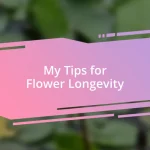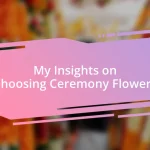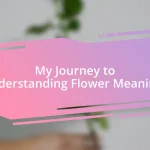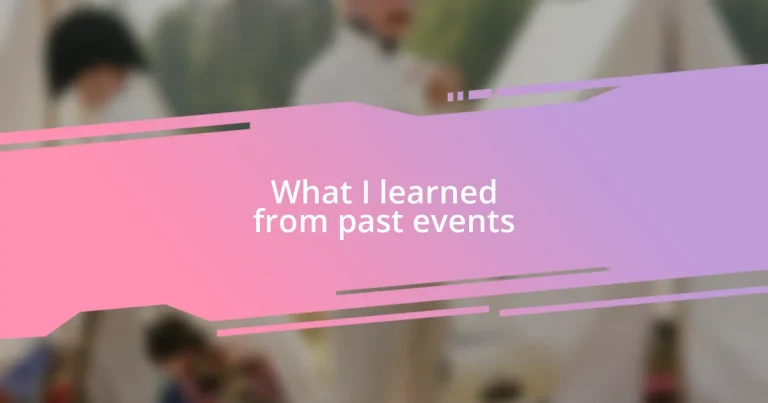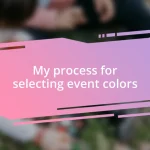Key takeaways:
- Understanding past experiences fosters personal growth and resilience, highlighting the importance of reflecting on failures and emotional responses.
- Identifying key lessons and recognizing patterns in behavior can lead to more informed future decisions and enhance communication in relationships.
- Sharing personal stories not only inspires others but also creates a sense of community, fostering connections and encouraging collective learning.
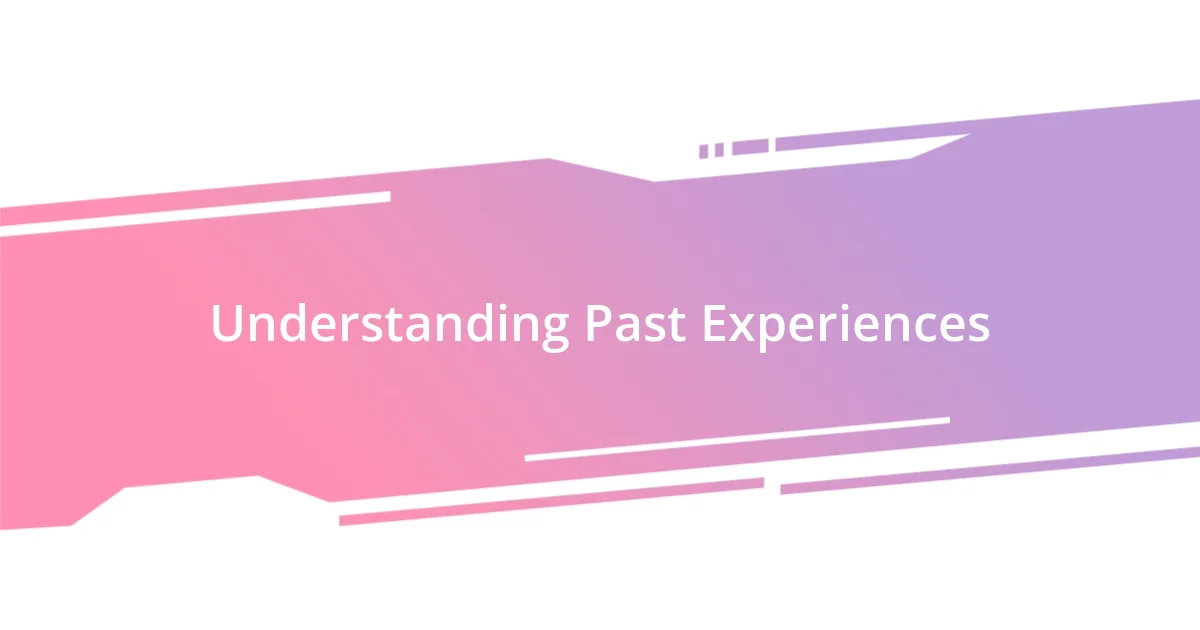
Understanding Past Experiences
Understanding our past experiences can be a transformative journey. Personally, I remember a time when I faced a significant failure in my career. It felt devastating at the time, but looking back, I see it as a crucial stepping stone that taught me resilience and the importance of adaptability. How often do we overlook these lessons, focusing only on the pain rather than the growth?
Every moment we’ve lived through adds a thread to the fabric of our identity. For instance, after a rough breakup, I felt lost and heartbroken. However, reflecting on this experience helped me realize how vital self-love and boundaries are in relationships. Have you ever stopped to consider how your past struggles have shaped your current beliefs and choices?
Sometimes, it’s easy to dismiss our experiences as mere memories. Yet, they serve as a compass guiding us toward more informed decisions. I often jot down my reflections in a journal, which brings clarity and aids in processing complex emotions. What if you took a moment today to write about a past event? You might uncover insights that offer profound guidance for your present and future.
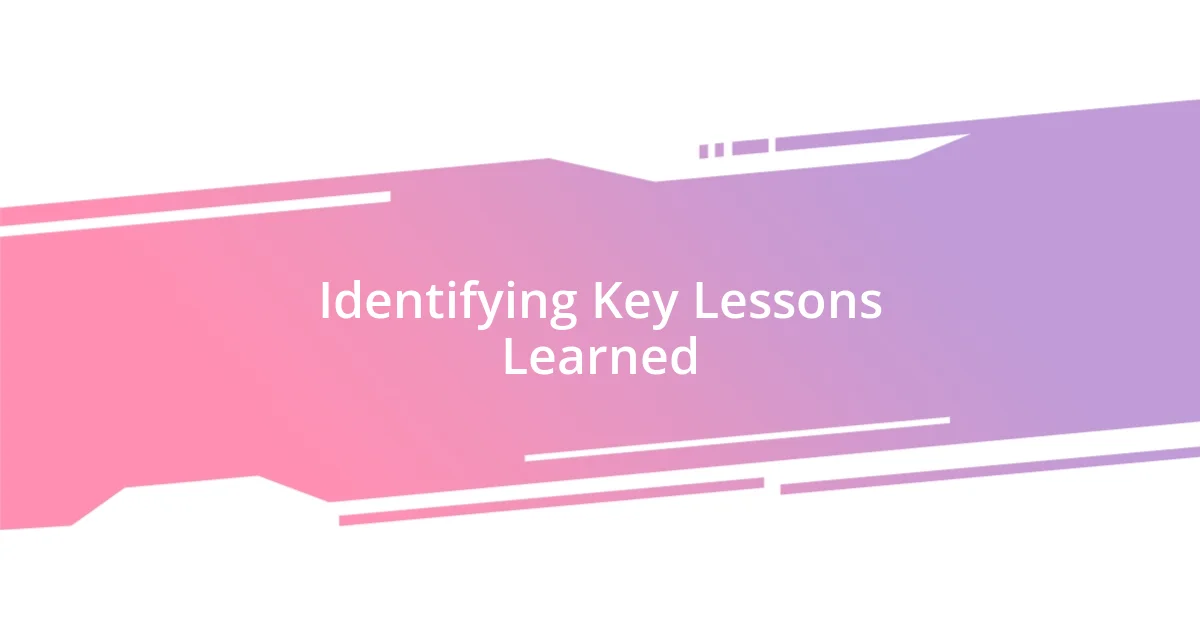
Identifying Key Lessons Learned
Identifying key lessons from our past events begins with a conscious effort to reflect on them. I remember a project I led that didn’t go as planned. At first, I was consumed by disappointment, but later, I recognized the importance of communication in teamwork. That experience taught me to approach future collaborations with openness and a willingness to listen.
To help pinpoint these valuable lessons, consider these steps:
– Reflect Thoroughly: Spend time revisiting the event in your mind and jot down your initial feelings and thoughts.
– Identify Patterns: Look for recurring themes in your experiences. This reflection can reveal underlying beliefs that might need adjustment.
– Focus on Solutions: Instead of dwelling on what went wrong, think about what could have been done differently. This shift in perspective can lead to constructive insights.
– Seek Feedback: Talking to trusted friends or mentors can provide external perspectives that highlight lessons you might not have seen.
– Create Actionable Steps: Transform insights into specific actions for future situations. This practical application reinforces the learning.
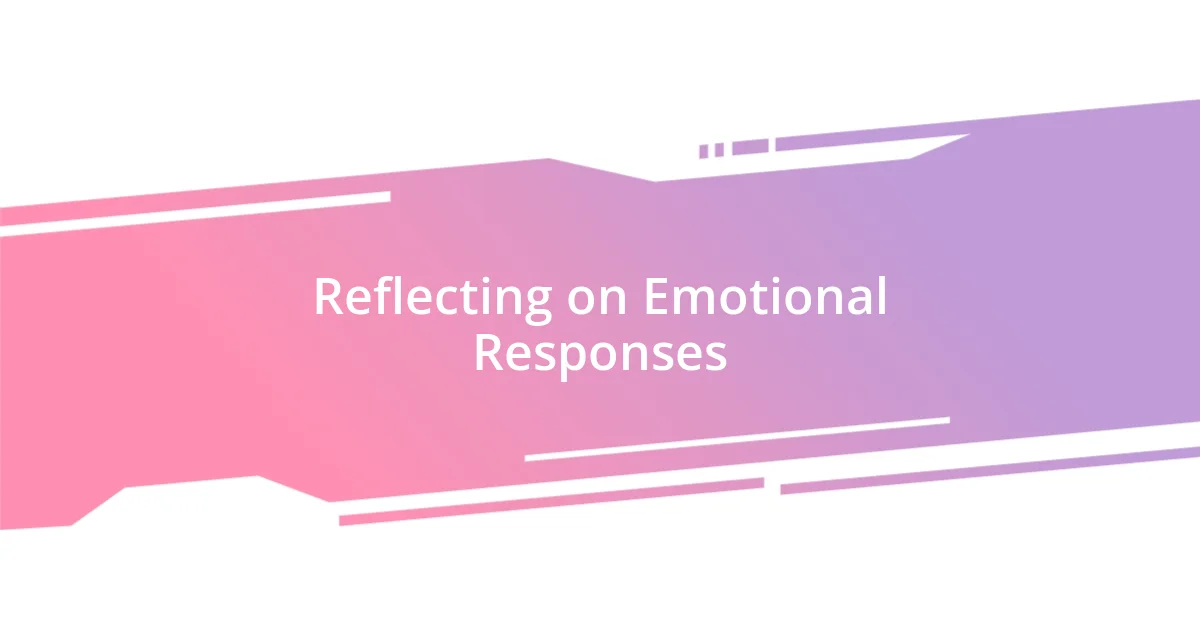
Reflecting on Emotional Responses
Reflecting on our emotional responses can be a revealing experience. There was a time when I faced a challenging situation that left me feeling completely overwhelmed. As I later revisited my emotions, I realized that the anxiety I felt was rooted in fear of the unknown. This insight not only helped me understand my reaction but also reminded me that acknowledging fear is the first step to overcoming it.
When I think about the times I felt rage, it often stemmed from feelings of helplessness. One particular instance comes to mind—a disagreement with a close friend. Initially, I reacted without thinking, letting my feelings get the best of me. However, upon reflection, I learned that my anger masked a deeper concern about vulnerability and trust. This understanding allowed me to approach similar situations with more patience and empathy. Have you ever noticed how your emotional responses might be telling you something deeper about yourself?
Acknowledging our emotional responses can act as a catalyst for personal growth. I’ve found that taking time to meditate on my feelings after a distressing event can provide clarity. Instead of rushing to bury those emotions, I ask myself what they might be teaching me. This practice has become incredibly valuable to me, as it creates space for introspection and understanding. Have you tried exploring the emotional layers behind your experiences?
| Emotional Response | Insight Gained |
|---|---|
| Fear | Understanding the importance of feeling and facing the unknown. |
| Anger | Recognizing that anger often masks deeper feelings of vulnerability. |
| Sadness | Learning that sadness can be a gateway to self-compassion and reflection. |
| Anxiety | Realizing that anxiety can indicate the need for preparation and awareness. |
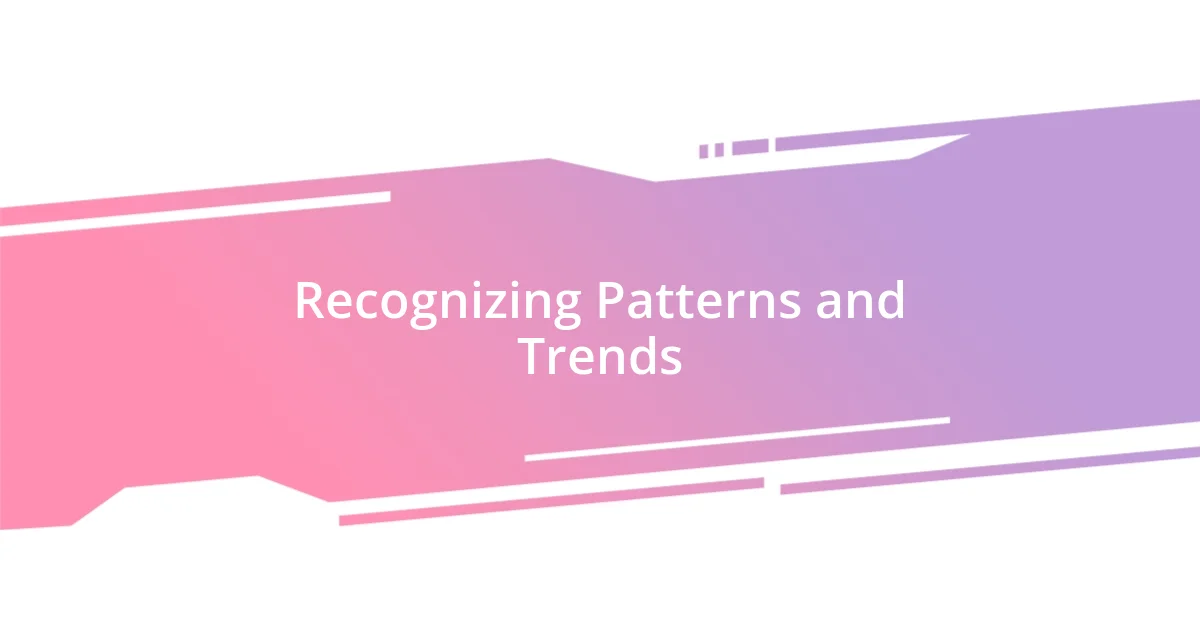
Recognizing Patterns and Trends
Recognizing patterns and trends in our past experiences is essential for growth and improvement. For me, it often feels like piecing together a puzzle. I remember when I tuned into the ways my responses to stress consistently mirrored my childhood reactions to pressure. In acknowledging this pattern, I learned that my automatic responses didn’t serve me well; they actually hindered my ability to make rational decisions. Have you ever noticed similar cycles in your own life?
Digging deeper into these patterns can unveil profound insights. During a challenging work project, I realized that every time I faced pushback, my instinct was to withdraw rather than engage. It hit me that this behavior stemmed from a past experience where my ideas were dismissed. By confronting this trend, I committed to actively participating in discussions, even when it felt uncomfortable. What shifts could you make if you choose to confront your own patterns?
When we connect the dots between past events and present behaviors, the potential for change becomes clear. I’ve noticed that the trends I observe aren’t just limited to professional settings; they also play out in my personal relationships. For example, I often found myself repeating the same arguments with loved ones. Recognizing this, I initiated conversations with the intention of understanding rather than defending my position. This small change has opened doors to much deeper connections. Isn’t it fascinating how the desire for growth can change the narrative of our relationships?
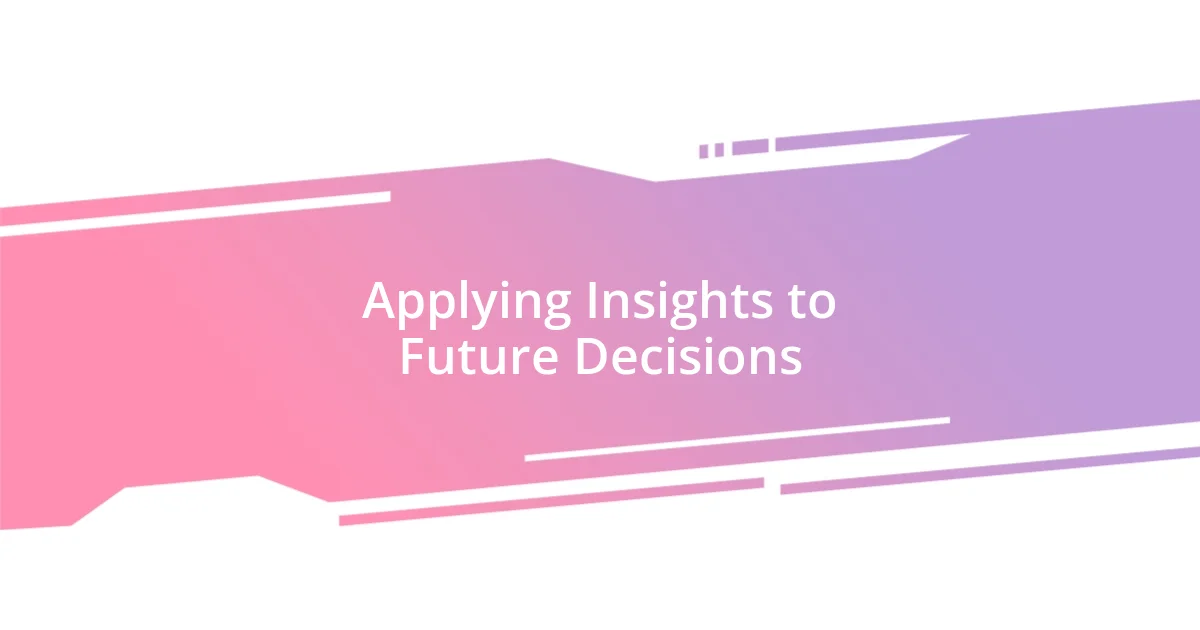
Applying Insights to Future Decisions
The insights gained from our past experiences are invaluable tools for shaping future decisions. I remember a time when I made a hasty decision in my career that didn’t align with my values. Upon reflection, I recognized that my rush stemmed from a desire to prove myself. Now, I approach potential opportunities with a more mindful perspective, asking myself if they truly resonate with my long-term goals. Have you ever felt the urge to rush into something without checking in with your values first?
As I consider my past choices, I see a pattern in the way I handle risk. There was a significant moment when I avoided taking a chance on a project simply because it felt too daunting. In hindsight, that fear was an opportunity in disguise. Now, I actively challenge myself to step outside my comfort zone, weighing the potential benefits rather than letting fear dictate my actions. How might your future look different if you embraced risk instead of shying away from it?
Another lesson I’ve learned is the importance of patience in decision-making. I recall a personal situation where I quickly dismissed an idea simply because it didn’t fit my initial expectations. After some thoughtful consideration, I revisited that idea and found value in it. This taught me that taking the time to reflect and assess all angles often leads to more informed decisions. Do you give yourself the space to reconsider and explore all possibilities before making a choice?
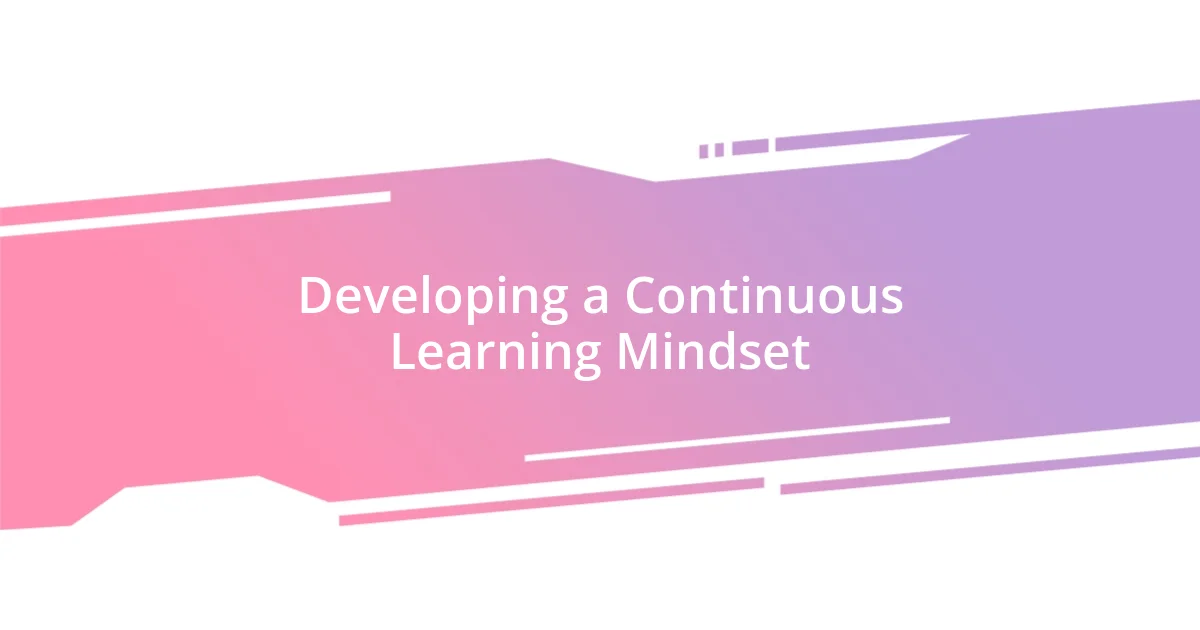
Developing a Continuous Learning Mindset
Embracing a continuous learning mindset has been transformative in my life. I recall a period when I viewed failures as end points instead of opportunities for growth. After a setback in a project, instead of wallowing in disappointment, I began journaling my thoughts. This practice allowed me to analyze my mistakes constructively. It’s funny how a simple act like writing can shift your perspective—have you ever tried looking at your failures as stepping stones instead of roadblocks?
One significant realization for me was that learning doesn’t always come from success. During a public speaking event, I fumbled my words and felt the sting of embarrassment. I used to avoid speaking engagements out of fear, but after this experience, I committed to understanding what went wrong. Each time I took the stage after that, I focused not just on delivering my message but also on refining my skills. I began enrolling in workshops to enhance my delivery. What if you viewed your fears as invitations to learn rather than reasons to retreat?
Creating a habit of seeking knowledge is vital for personal and professional development. I now set aside time each week to explore new topics, whether through podcasts, books, or discussions with peers. Recently, I joined a book club that challenges my perspective and encourages me to think critically. I find that breaking out of my usual routine not only nurtures my curiosity but also fosters meaningful connections. How do you ensure that learning remains a priority in your life?
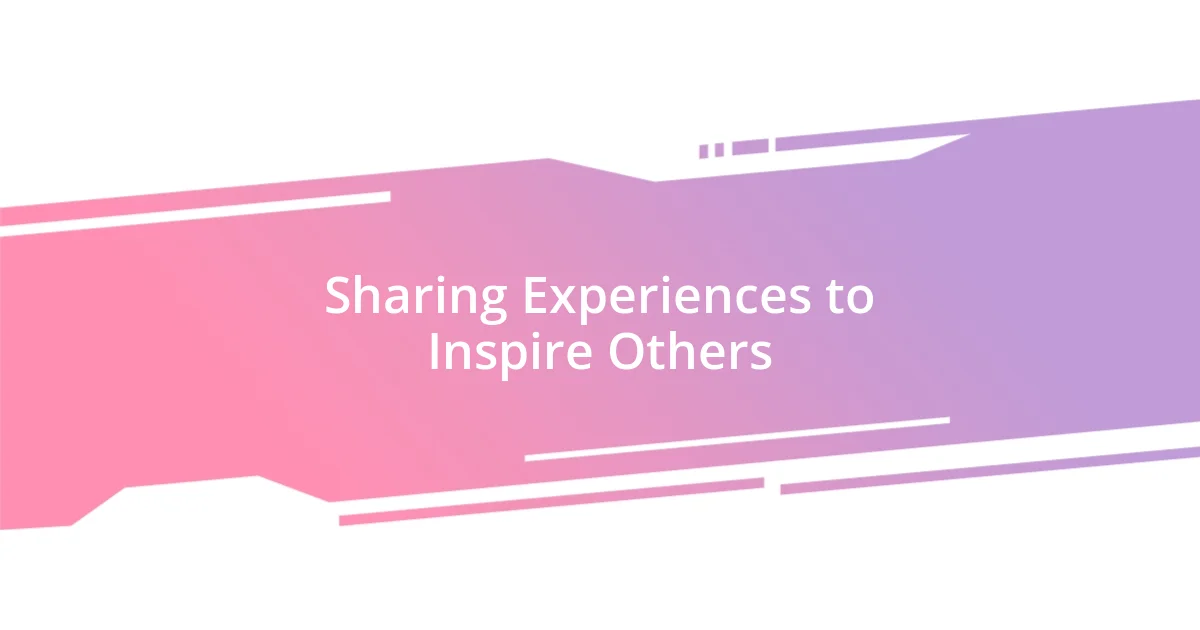
Sharing Experiences to Inspire Others
Sharing experiences can be a powerful way to inspire others, and I’ve seen this impact firsthand. Not long ago, I shared a story about a particularly tough time when I struggled with my self-esteem after receiving criticism on an important project. As I spoke about how I turned that pain into a driving force for improvement, I noticed the nods and smiles from my audience. Isn’t it amazing how our vulnerabilities can connect us and motivate others to embrace their struggles, too?
When I think about the moments that shaped me, I realize the importance of storytelling in building community. I once participated in a workshop where each person shared their biggest failure. It was enlightening to hear everyone’s vulnerabilities and triumphs; many left feeling uplifted. This experience taught me that sharing our stories not only validates our own journeys but also encourages others to open up. How can your own stories create spaces for others to feel safe and understood?
I’ve also found that sharing experiences encourages reflection, both for myself and the listener. After recounting my challenges with work-life balance in a group discussion, a friend approached me with her own story of burnout. That moment sparked a conversation about self-care strategies that none of us had previously considered. It’s remarkable how one person’s narrative can plant the seeds for collective growth. What insights could your experiences offer to someone who might desperately need to hear them?




